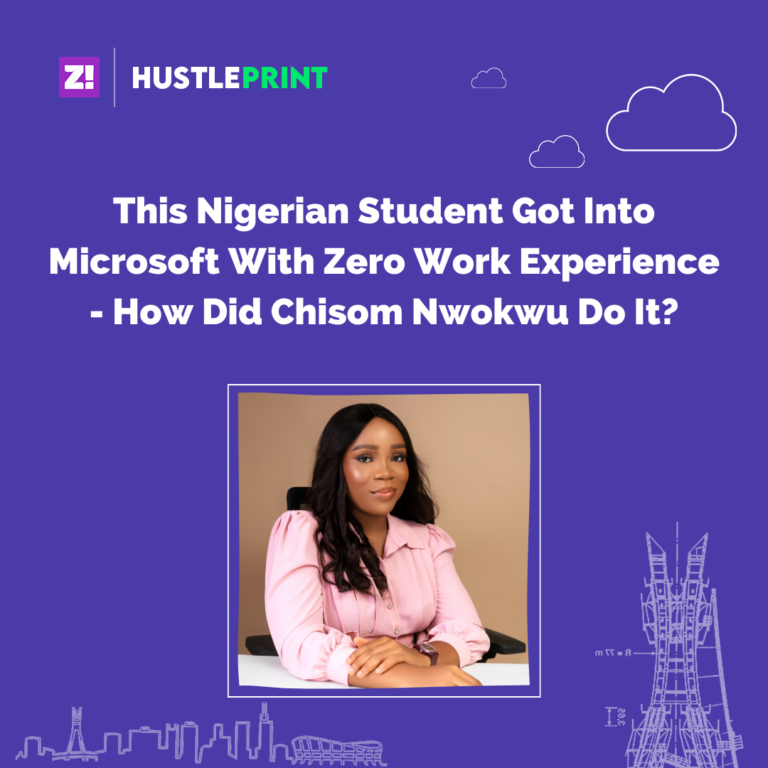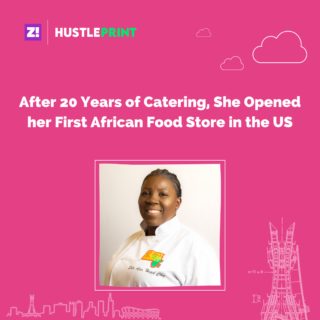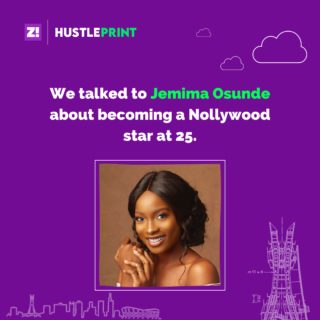Every week, Zikoko will share the hustle stories of Nigerians making it big in and out of the country. With each story, we’ll ask one crucial question in several ways: “How you do am?”
So Zainab, how you do am?
The story is long.
I never had one dream. At some point, I loved mathematics and wanted to study that, but by the time I finished secondary school, I wanted to study chemical engineering — it was the most interesting option for a science student who didn’t want to go for medicine — but I didn’t get in. West African Examinations Council (WAEC) did me dirty.
What happened?
My Senior Secondary Certificate of Education (SSCE) results were delayed. I had to use my General Certificate Examination (GCE) instead. But who really aces GCE? Of all the subjects, biology was the one that messed me up. Without it, I couldn’t apply to the chemical engineering department at the University of Ilorin.
By the time WAEC decided to release our SSCE results, the department was full. I wasn’t ready to stay home for a year. And that’s pretty much how I ended up in Agricultural and Biometrics engineering. I had no clue what it was about.
I relate to the madness of WAEC, but this interview isn’t about me
Studying agricultural engineering wasn’t a horrible experience though. I took some helpful courses from other engineering departments and there was some programming involved. In 200 level, I took a programming class called Visual Basic, which was a third-generation and old programming language. Nevertheless, it sparked an interest because I was super interested in programming in general.
The issue was what job I’d be able to get in Nigeria. When I got to 400 level, that question became even more difficult to answer. While my guys in other engineering departments were able to get internships in big oil companies, I was stuck working at a government ministry in Ilorin. No shade to government workers, but I knew I wasn’t interested in working there.
So you didn’t know where you would work after school?
Not exactly. But like my mates in other engineering departments, I wanted the flexibility of choosing big organisations in the private sector. I didn’t want to be stuck at a job because I didn’t have any other choice.
After my internship, I was sure I’d transition into another field of engineering. I considered mechanical engineering because I took a lot of courses with the mechanical engineering department, and I could relate more with that. It also seemed interesting, and that’s how my transition began.
And to the meat of our gist
After my NYSC in 2016, I applied for a master’s degree in advanced mechanical engineering with management at the University of Leicester, UK. I ended up deferring my admission because my visa was delayed.
I just took the delay as a gap year and used the free time to learn coding. I couldn’t take the programming classes in uni as seriously as I’d wanted because there was no time. Now, I had all the time in the world.
I started with coding courses online, but I wanted to try out for an internship. So I searched for internships and found a tweet from Hotels.ng calling out for interns.
I got in, but the it was too fast paced for me as a complete beginner.
Nevertheless, I’m grateful for the community the program gave me. I had the opportunity to meet and connect with people of different level of technical skills both online and offline, some of who I’m still connected with today.
A few weeks after the internship, I applied for the first Andela Learning Community sponsored by Google at the time. The program’s structure was hybrid, so I had more access to people in the tech community in Ilorin. That was a plus to the Twitter community I discovered from my Hotels.ng internship.
At this point, what tech skill were you focused on building?
Android development. It made me consider switching my master’s degree to computer science. But I didn’t want to flop.
When I finally went for my master’s in 2017, my interest switched to artificial intelligence. We were taking a modelling and statistics course that covered how algorithms make it easy for computers to classify and recognise objects. I was curious.
I read more about artificial intelligence on my own, and that’s how I stumbled on data science. It seemed like the perfect mix of my interests. The programming aspect I’d learnt before my master’s degree and the data part covered statistics and mathematics.
So the best of both worlds?
Exactly. It only made sense to branch out into data science and start taking courses online.
Sweet. When did you land your first role?
Towards the end of my master’s degree in 2018. At first, I was applying for any kind of job. Whether it was consulting or banking, I applied because I didn’t want to leave the UK after school. But I wasn’t getting feedback. Eventually, I realised I had to stay focused on my initial goal to work as a data scientist.
I started applying for analytics roles aggressively. I must have sent at least 300 applications before I got my first interview invite. The initial chit-chat with the team went great, but the technical assessment made me nervous – it was my first job, and I didn’t know what to expect. I hadn’t worked on a real-life data set. Essentially, I wasn’t very confident in my skills for these reasons.
The whole room started spinning in my head. And I flunked the test.
But you still got the job?
Yeah. On my trip back home, I sent an email to the team and thanked them for the opportunity. But I also added in an apology for messing up my test. I explained how nervous I felt, and the pressure from writing my dissertation while preparing for the test. I guess they understood.
Surprisingly, the team asked me to take the test again. This time I had two weeks to submit the test like a take-home assignment. I still didn’t ace it though.
And you still got the job, Zainab?
LMAO. Yes. They felt the email demonstrated my willingness to learn. At least that’s what their email said. My job at the company was assisting the team with analysing market research surveys.
This was my first taste of the corporate world was great. At least for the four months, it lasted.
What happened?
I couldn’t sort out the extension on my UK visa, so I moved back to Nigeria.
The company allowed me to work remotely, but between the horrible internet and frustrating generator noises at many meetings, keeping up was impossible. I decided to leave.
I’m sorry. How did the Nigerian job market compare to the opportunities in the UK?
It was next to zero. I searched for data analyst roles on LinkedIn and there was nothing available. I reached out to my friends in tech for help. I remember one texting me about my salary expectations for a particular role. I said ₦500k. I’m sure the guy laughed because, thinking about it now, I had barely a year of experience to offer. But still, how was I to know? I didn’t understand the jobscape in Nigeria.
A month later, I got a job with an energy company. I was doing everything data and engineering-related at the company. I’d go to sites to set up energy metres and still spend time analysing the energy consumption of all our clients. The workload was a lot. I needed something else.
Fascinating
But while I was still at the energy company, a friend started a data visualisation community. The goal was to connect and learn how to present information visually with graphs. But I didn’t have time to dedicate to learning and practising this until the lockdown.
During the pandemic, it was easier to attend classes. Tableau was one software people in the data industry talked about, so I dedicated more time to practicing. Every project I did went up on Twitter, and I started gaining traction. I was just everywhere at the time plugging my work.
Nine months into my job at the energy company, a friend directed me to a fintech company searching for product analysts. I applied, got the job and spent the next year there.
The next stop was Spotify.
How did the Spotify offer happen?
The weekly Twitter posts became my portfolio online. I didn’t know it at the time, but people were watching. In 2021, a senior data scientist at Spotify sent me a DM on Linkedin. He was recruiting for his team and asked me to apply for the job. I went through a five-stage process, and that was it.
I got the job and relocated to Sweden in April 2021. It’s been a year since I joined the Sweden team. Now, I’m looking forward to a new experience at the London office in May.
Nice. How has the experience been so far?
Spotify is a cool company. At first, working in a big company was overwhelming, especially after coming from a startup but I’ve eased into it. There’s more structure than I was used to, and everyone’s role is defined and clear.
Speaking of roles, what exactly do you do at Spotify?
I help product teams make informed decisions with data. One aspect is through visualisation. For instance, if there is a goal to reach x billion user streams, I build dashboards where people can go to monitor the progress. I also do exploratory deep dives into certain trends and patterns observed and test different hypotheses based on data observations. These analysis are presented to products teams and other stakeholders who then make decisions based on them.”
That’s huge. What’s one thing you think has prepared you for this role?
I’d say consistently learning and moving forward. My career journey never looked put together to me. I went from engineering to programming to data science and now, data visualisation. I think by now you should know I work with vibes.
The funny thing is, when I went to the UK for my master’s, Spotify was one of the first apps I downloaded. I’d never experienced anything as good as their recommendation engine. The algorithm knew the exact songs I’d want in a playlist. As a tech enthusiast, that was insane. I wanted to understand how it worked.
At that point, I couldn’t have believed I’d end up working at Spotify. Every decision I made about my career was vibes, a little bit of strategy and a lot of luck.
What do you think is next for your career?
Right now, I want stability. I’ve spent the last two years moving companies, so I’m focused on building at Spotify. At least for another year or two.




